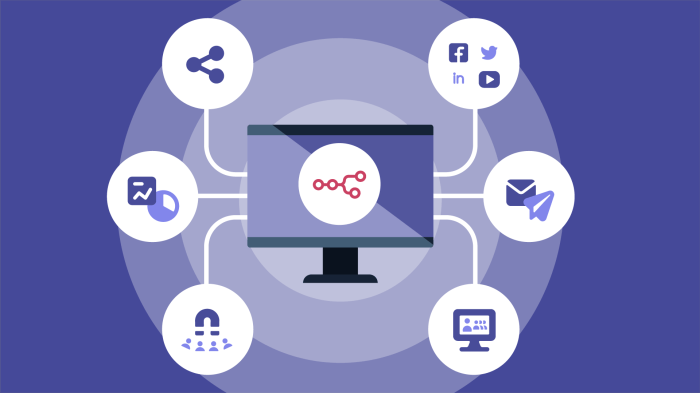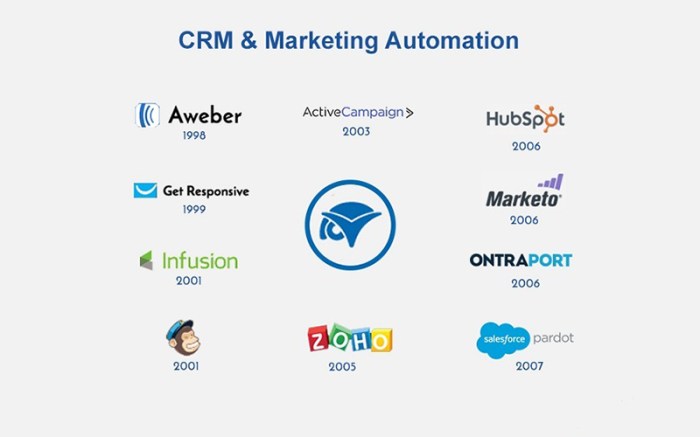Understanding Marketing Automation Tools dives into the world of automated marketing, showcasing how businesses can leverage cutting-edge technology to boost efficiency and drive growth. Get ready to explore the exciting realm of marketing automation tools!
Introduction to Marketing Automation Tools
Marketing automation tools are software platforms designed to help businesses automate their marketing processes, streamline tasks, and improve efficiency. These tools allow companies to target their audience more effectively, nurture leads, and analyze campaign performance.
Popular Marketing Automation Tools, Understanding Marketing Automation Tools
- HubSpot: HubSpot is a comprehensive inbound marketing and sales platform that offers a variety of automation features such as email marketing, social media management, and lead tracking.
- Mailchimp: Mailchimp is a popular email marketing tool that also provides automation capabilities for creating targeted campaigns, segmenting contacts, and tracking customer interactions.
- Pardot: Pardot is a marketing automation tool by Salesforce that focuses on B2B marketing, offering lead management, email marketing, and CRM integration.
Benefits of Using Marketing Automation Tools
- Increased Efficiency: Automation tools help businesses save time by automating repetitive tasks such as email campaigns, lead nurturing, and social media posting.
- Improved Lead Management: By automating lead scoring and tracking, businesses can better prioritize leads and personalize their interactions based on customer behavior.
- Enhanced Analytics: Marketing automation tools provide valuable insights into campaign performance, customer engagement, and ROI, allowing businesses to make data-driven decisions for future marketing strategies.
Features of Marketing Automation Tools

Marketing automation tools come with a variety of features that help businesses streamline their marketing processes and improve efficiency. These key features commonly found in marketing automation tools include:
Data Management and Segmentation
- Tools that allow businesses to collect and organize customer data efficiently.
- Segmentation capabilities to target specific audiences based on demographics, behavior, or other criteria.
- Personalization options to tailor marketing messages to individual customers.
Campaign Management
- Automated email campaigns to nurture leads and engage customers over time.
- Scheduling and tracking of marketing campaigns across multiple channels.
- A/B testing functionality to optimize campaign performance.
Lead Management
- Lead scoring to prioritize and qualify leads based on their interactions with the business.
- Lead nurturing workflows to guide leads through the sales funnel.
- Integration with CRM systems for seamless lead management.
Analytics and Reporting
- Real-time tracking of campaign performance and customer interactions.
- Detailed analytics to measure ROI and identify areas for improvement.
- Customizable reports to gain insights into marketing effectiveness.
Implementation of Marketing Automation Tools
Implementing marketing automation tools in a business can be a game-changer, but it requires careful planning and execution to ensure success. Here are some steps to successfully implement marketing automation tools and best practices for integrating them with existing systems.
Steps to Successfully Implement Marketing Automation Tools:
- Define Goals and Objectives: Clearly Artikel what you want to achieve with marketing automation tools.
- Choose the Right Tool: Select a tool that aligns with your business needs and goals.
- Train Your Team: Provide adequate training to your team members to ensure they can effectively use the tools.
- Start Small: Begin with a pilot project to test the tool before scaling up.
- Monitor and Analyze: Continuously monitor the performance of the tools and analyze the data to make informed decisions.
Best Practices for Integrating Marketing Automation Tools with Existing Systems:
- Ensure Compatibility: Make sure the marketing automation tools can seamlessly integrate with your existing systems.
- Data Migration: Transfer data accurately from your current systems to the new tools without losing any valuable information.
- Customization: Customize the tools to fit the specific needs of your business and target audience.
- Collaboration: Encourage collaboration between different teams within your organization to maximize the benefits of the tools.
Common Challenges Faced During Implementation and How to Overcome Them:
- Resistance to Change: Address resistance by involving employees in the decision-making process and highlighting the benefits of the new tools.
- Lack of Training: Provide comprehensive training to ensure all team members are proficient in using the tools effectively.
- Data Security Concerns: Implement robust security measures to protect sensitive data and reassure stakeholders about data privacy.
- Integration Issues: Work closely with the tool provider and IT team to address any integration challenges that may arise during implementation.
Effective Use Cases of Marketing Automation Tools: Understanding Marketing Automation Tools

In today’s digital age, many companies have successfully leveraged marketing automation tools to streamline their marketing efforts, enhance customer engagement, and drive business growth. Let’s delve into some real-life examples of companies that have effectively utilized marketing automation tools:
Case Study 1: Company A
- Company A, a global e-commerce retailer, implemented marketing automation tools to personalize their email campaigns based on customer behavior and preferences.
- By sending targeted and relevant content to their customers, Company A saw a significant increase in open rates and click-through rates.
- As a result, their customer engagement improved, leading to higher conversion rates and increased sales.
Case Study 2: Company B
- Company B, a software-as-a-service (SaaS) provider, utilized marketing automation tools to automate lead nurturing processes and track customer interactions across multiple channels.
- Through lead scoring and segmentation, Company B was able to identify high-potential leads and deliver personalized communication at the right time.
- This approach not only improved the efficiency of their marketing campaigns but also resulted in a higher ROI as they focused their efforts on qualified leads.
Case Study 3: Company C
- Company C, a B2B technology company, integrated marketing automation tools into their CRM system to streamline lead management and improve sales alignment.
- By automating lead scoring, nurturing, and follow-up processes, Company C was able to deliver timely and relevant content to prospects, resulting in a shorter sales cycle.
- The implementation of marketing automation tools not only increased their marketing efficiency but also contributed to a significant boost in overall business growth.
Future Trends in Marketing Automation
In the ever-evolving landscape of marketing automation, it is crucial to keep an eye on the emerging trends that are shaping the future of this industry. From the integration of AI and machine learning to the customization of customer experiences, the future of marketing automation tools looks promising and dynamic.
Role of AI and Machine Learning
AI and machine learning have already started to play a significant role in shaping the future of marketing automation. These technologies enable marketers to gather and analyze vast amounts of data, allowing for more personalized and targeted marketing campaigns. AI-powered tools can automate tasks, optimize campaigns in real-time, and provide valuable insights into customer behavior. As AI continues to advance, we can expect to see even more sophisticated automation tools that can adapt and learn from customer interactions to deliver more personalized experiences.
Evolution of Marketing Automation Tools
Marketing automation tools are likely to evolve to meet changing business needs by becoming more integrated and intelligent. We can anticipate the development of tools that can seamlessly integrate with other systems, such as CRM platforms, to provide a more holistic view of customer interactions. Additionally, automation tools may become more intuitive and user-friendly, allowing marketers to easily create and deploy complex campaigns without the need for extensive technical knowledge. The future of marketing automation is all about efficiency, personalization, and adaptability to meet the ever-changing demands of the market.






